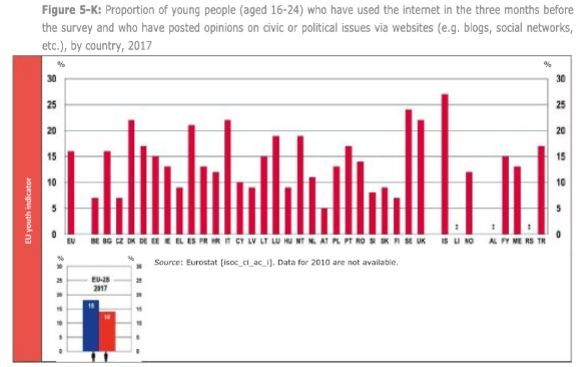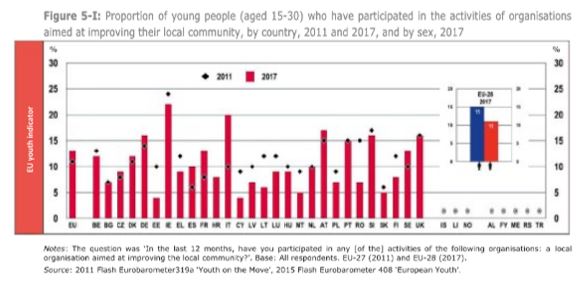Youth participation in decision-making process
Participation in the decision-making processes and policy-making is a stepping stone to the involvement in community life. Over the last four decades, the participation of young people in social, political and civic decision-making has become increasingly important. Youth participation is a key topic for youth policy within the European Union, the Council of Europe, and many other stakeholders in youth work practice and research. Youth participation is a priority in the European Union Youth Strategy in the period 2019-2027, with a separate pillar devoted to participation [engage]. This tool elaborates more on the basic definitions of youth participation, the current trends of participation, the debates, the dilemmas, and the role of schools and educators.

Participation is not an easy concept to define. Most reflections go into a direction where participation is rather a process than a one-time event[1]. Participation is an essential element of citizenship in a democratic society, and democratic Europe. European institutions and organizations repeatedly emphasize the importance of youth participation to foster young people’s active citizenship, enhance their integration, their inclusion and strengthen their contribution to the development of democracy.
The revised European Charter on Participation of Young People in Local and Regional Life of the Congress of Local and Regional Authorities of the Council of Europe states:
[1] EU-CoE Youth Partnership Reflection Group on Youth participation (2014), “Revising youth participation: current challenges, priorities, and recommendations”.
“Participation in the democratic life of any community is about more than voting or standing for election, although these are important elements. Participation and active citizenship are about having the right, the means, space and the opportunity and where necessary the support to participate in and influence decisions and engage in actions and activities to contribute to building a better society”
The Council of Europe recommends that the Members States facilitate and encourage youth participation in politics and civil societies at both local community and national levels, and it also makes youth participation a priority in public policies[1].
Young people that form opinions are inherent in all definitions of youth participation. They take action and also exert influence. The right of a young person to express their views, in all matters affecting them, is preserved in a fundamental right – not only at the European level but also, for those aged under 18, in the United Nations Convention on the Rights of the Child, the most widely ratified international treaty in history.
Youth participation involves both ‘spaces’ where young people can express their views, their opinions. It also includes opportunities for decision-makers to listen to those views and opinions, and take them into account. Youth participation is relevant to individual young people when decisions are being made about an aspect of a young person’s life – for example, their health, and their education. Participation is collectively relevant to young people especially when decisions made affect most of them. An appropriate example is a municipality, designing a housing project.
The paradox of youth participation
Since 2010, young people have shown an increasing interest in politics, yet the electoral turnout continues to decrease amongst young Europeans, especially on occasions of EU elections[2]. However, under what has been termed the ‘paradox of youth participation’, alongside the decreasing formal (or conventional) forms of participation– such as voting and membership of political parties,– in recent years, there has been increasing informal (or unconventional) ways of participation. Research evidence indicates that young people are far from apathetic. They are participating more in non-conventional ways. The unconventional forms of political participation are much enhanced by information and communication technology (ICT) and virtual spaces. The virtual spaces include online forums, chat rooms, social networks, and blogs, etc. Unconventional forms of political participation might include activities such as signing petitions or participating in political demonstrations which are outside the electoral process, or formal political institutions.
On average, one in two young Europeans uses the internet and its social media to interact with public authorities[1]. Data collected by Eurostat show that, on average, 46% of young Europeans were using the internet to contact or interact, with public authorities in 2017. This percentage in the Scandinavian countries is very high, whereas, in the Southern European countries, it is lower. It might be expected that the level of education, particularly in the area of digital competences, would influence the opportunities that young people have, to take full advantage of new technologies for engaging in political interaction.

Self-expression is an important unconventional form of participation. As young people define themselves by increasingly diverse lifestyles, identities, and values, their civil and political engagement tends to be more issue-based, more personal and more informal. Various phenomena such as migration and mobility, consumerism and individualization, as well as economic crises, are introducing new challenges. Participation often serves as a means of self-expression, and conscious consumption by voicing opinions with T-shirts, badges or bags, and similar methods that are visible in social (online) networks. They gain popularity. Some argue that the rise of individualization in consumer societies can give rise to an exaggerated emphasis on the self, and the loosening of community ties.
Other authors argue that the trend for self-expression is another motivation for new and innovative forms of youth participation. It is not always clear who exactly young people are directing their activism and expressions to, and also how they are seeking to influence the process of decision making which would lead to change in the public policy.
Research suggests that more individualized, horizontal forms of participation are attractive for young people because they do not demand long term commitment, endangering the integrity of individuals by imposing ideologies or demanding loyalty to an organization’s aims and methods.
Learning about youth participation
Research suggests that young people learn about participation by doing it. They learn through formal education such as schools and through, non-formal education like youth clubs and civic organizations, and also from the local and regional youth councils and parliaments[1]. Learning about participation opportunities have to be available to young people, with barriers reduced, and support provided to develop skills. Educators (in both formal and non-formal settings) need to be equipped with the capacities for developing and implementing processes that encourage the learner’s ability to develop motivation and competences for participation.
Schools and other educational institutions play an important part in the development of democratic identities. It has been recognized that citizenship education in these institutions, as well as in youth clubs and civil society organizations, strengthen the culture of the ongoing practice of democratic participation. Schools and educational institutions are places where young people get to know what participation in a democracy means through a variety of activities such as electing class representatives, meeting with local politicians and engaged local citizens, working in community-oriented service projects, or even setting up a youth parliament in the local community[2].
The Youth Partnership’s reflection group calls for such education to be mandatory, not ‘boring’. It should not be based only on books, but also on activities that include debates, contacting serving politicians and decision-makers at all levels, shadowing, mentoring and internship opportunities[3]. However, what is clear from the review of the literature on youth participation is that, as well as ‘teaching’ young people about democracy and participation and equipping educators to do so, is that the institutions of democracy – our parliaments and many of our politicians – also have to learn much more about youth participation, and what it means to listen and take account of young people’s views, opinions and ideas.

Trainers, as educators in the non-formal setting, have an essential role in providing young people with guidance on their participation in the decision-making processes. Trainers become increasingly important in the “learning to participate” process, especially when recent research shows that young people are more active in the non-governmental organization and local organizations than in political parties.
Why did I choose this tool?
Youth participation in decision-making processes is essential to being civically engaged. I chose this tool because it provides relevant insight into youth participation on the EU level, by referring to credible, recent research and findings. I believe this tool will be useful for trainers to better inform themselves and continue their learning with the references provided.
Reflection questions
What is the trainer’s role in empowering youth participation?
How do you empower young people to be more democratically active?
How can young people use their social media impact to influence decision making and make a change in public policy?
How can you guide the self-expression of a young person towards a certain policy change?
Exercise:
– Describe what you would say to a friend that doesn’t want to vote in elections? She doesn’t believe that voting will change anything and that no one from the candidates does not relate to her personal goals and work. She is saying that she is active enough by posting on social media and she doesn’t need to vote to prove her citizenship or gain anything in return.




